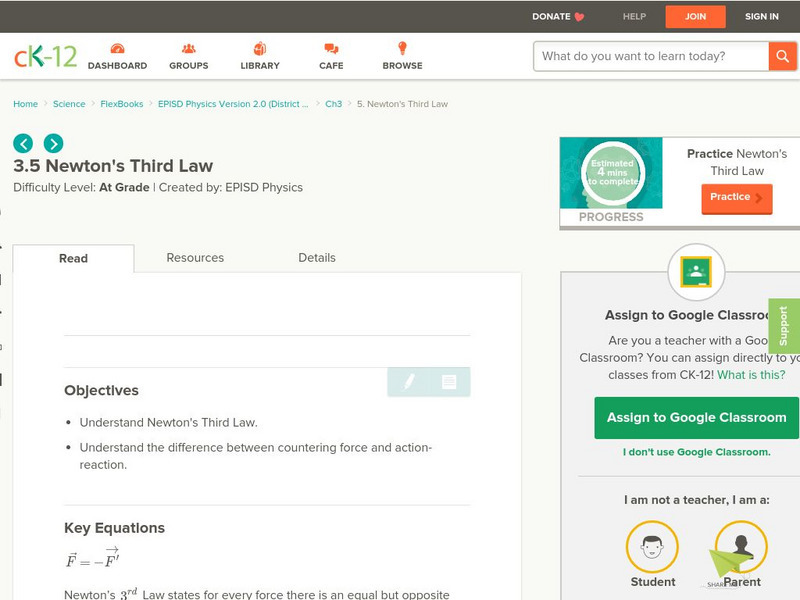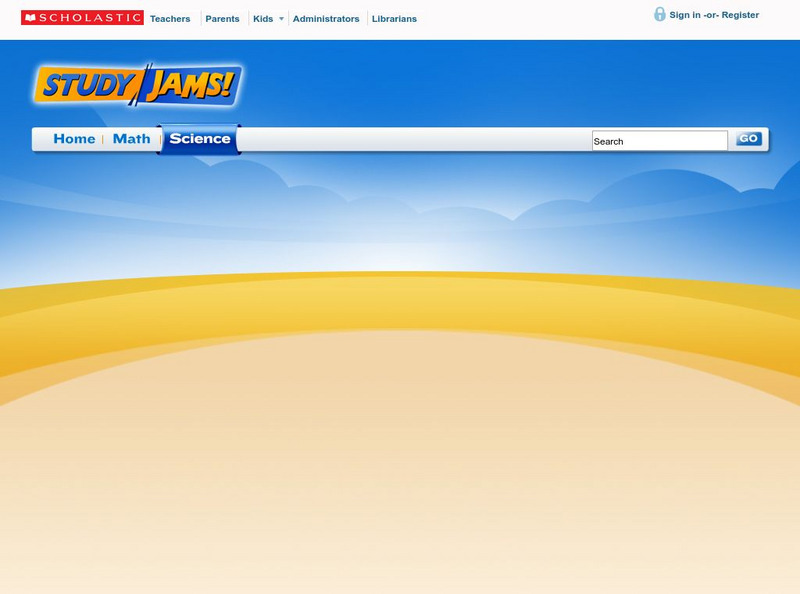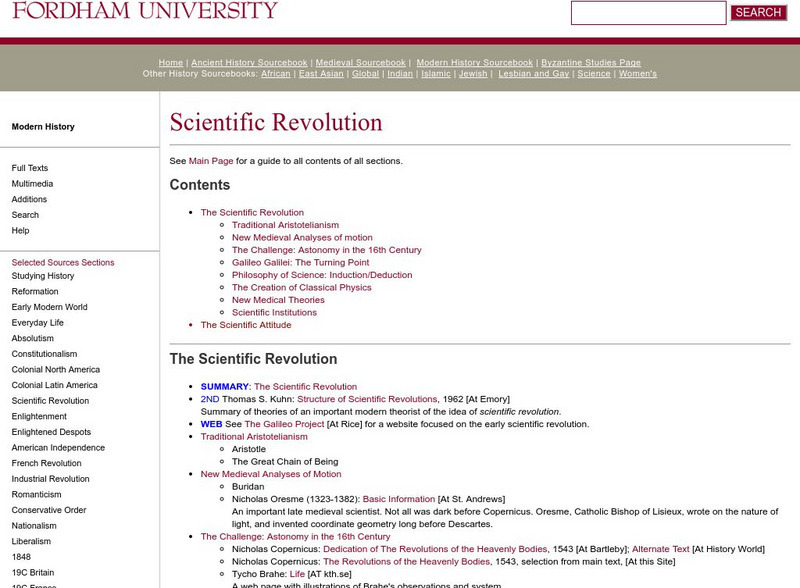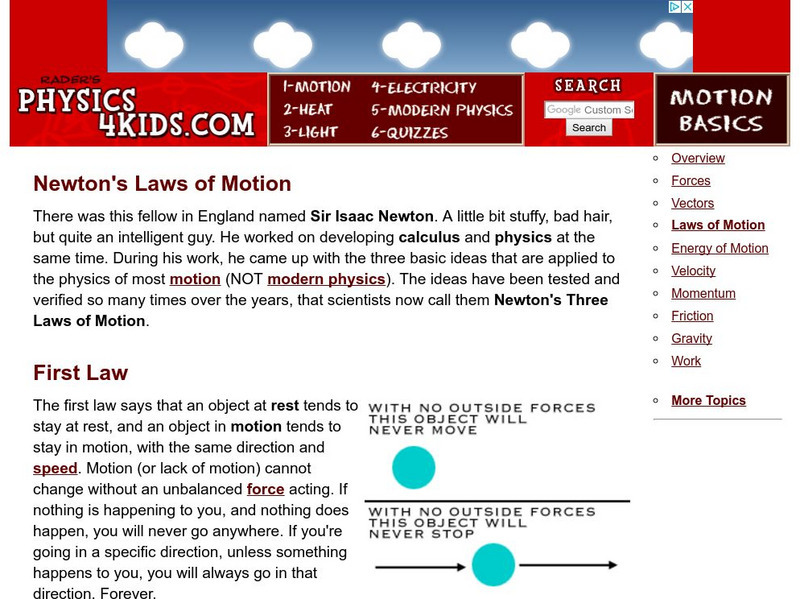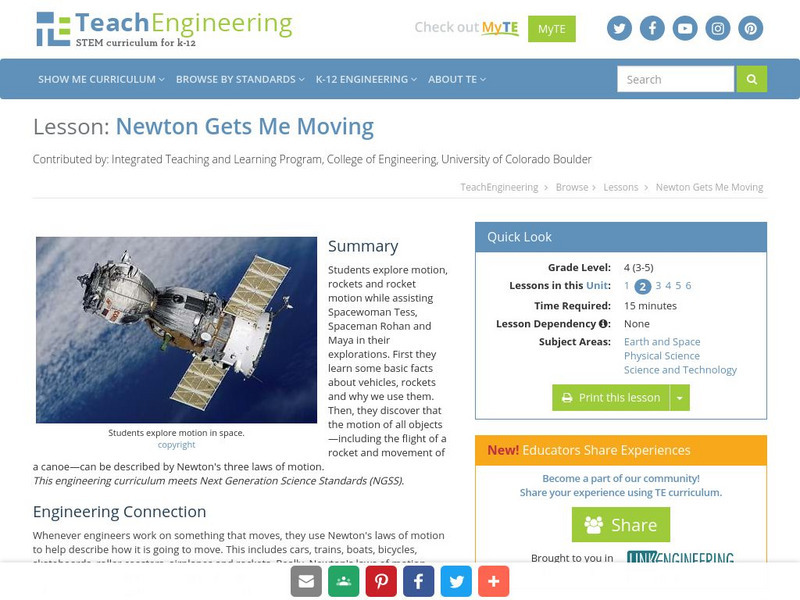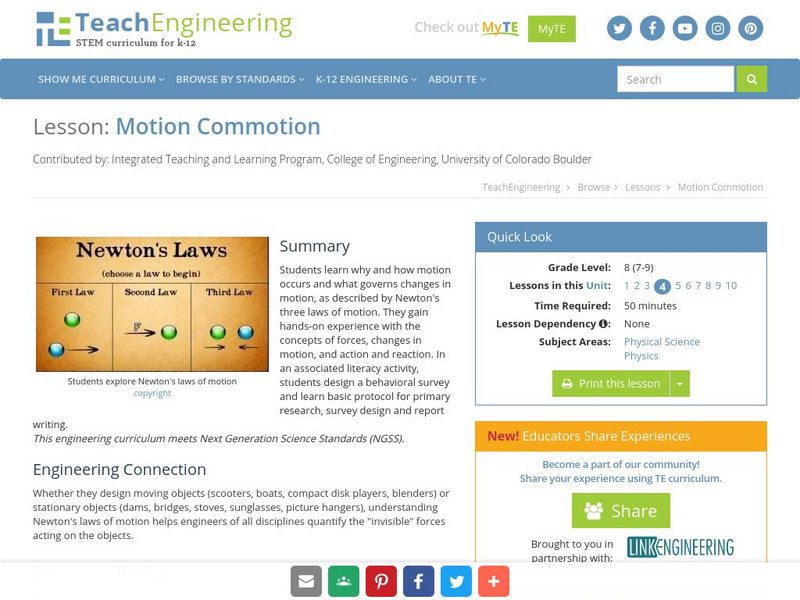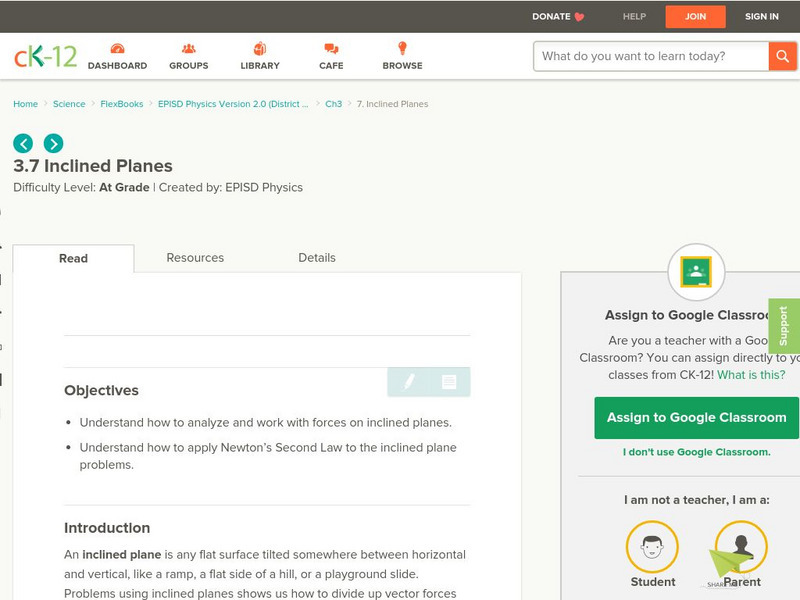Hi, what do you want to do?
Soft Schools
Soft Schools: Physics Quizzes: Newton's Three Laws
Assess your understanding of Newton's three laws of motion and the ability to distinguish between the three with this interactive multiple choice quiz. Receive immediate feedback to your answers.
Georgia Department of Education
Ga Virtual Learning: Ap Physics 1: Newton's Laws of Motion
Newton's three laws are deceptively simple, but they are the underpinning of all of physics and govern the mechanics all of your actions in everyday life. Take an in-depth look at these laws in this learning module.
PBS
Pbs Learning Media: Newton's Triple Play: Baseball Science
In this lesson, students watch a video and animations that relate Isaac Newton's three laws of motion to baseball and apply what they've learned about these laws to another sport or other real-life situation.
CK-12 Foundation
Ck 12: Episd: Newton's Third Law
[Free Registration/Login may be required to access all resource tools.] Understand why for every action there is an equal and opposite reaction.
Physics Classroom
The Physics Classroom: Inertia and Mass
This is part of a lesson on Newton's Laws of Motion that focuses on inertia and mass. It restates Newton's first law of motion. The lesson also gives a helpful visual description concerning friction.
Scholastic
Scholastic: Study Jams! Science: Forces and Motion: Action and Reaction
A video and a short quiz on Newton's Third Law of Motion. It breaks down what action and reaction mean, and how mass and acceleration factor into the outcome of a collision.
Sophia Learning
Sophia: Newton's First Law: Lesson 3
This lesson introduces Newton's First Law, that inertia causes objects at rest to remain at rest, and objects in motion to remain in motion. It is 3 of 3 in the series titled "Newton's First Law."
Sophia Learning
Sophia: Newton's Third Law: Lesson 2
This lesson will show that when a force is exerted on an object, an equal and opposite force is produced, as stated in Newton's Third Law. It is 2 of 3 in the series titled "Newton's Third Law."
Alabama Learning Exchange
Alex: Newton's Three Laws
This technology-based lesson plan will review Newton's three laws of motion. After reviewing the laws, the students will be divided into three groups. Each group will be assigned one of Newton's laws and asked to create a presentation...
Science Struck
Science Struck: A Guide to Projectile Motion With Real Life Examples
Projectile motion is explained here. Includes a discussion of Newton's Second Law of Motion, the formulas used to make different calculations, real-life examples of projectile motion at work, and sample problems with solutions.
Physics Classroom
The Physics Classroom: Newton's Laws: Double Trouble
Through the use of free-body diagrams and Newton's laws, students analyze the motion of two objects together.
Texas Education Agency
Texas Gateway: Force and Newton's Laws: Section Summary
This page summarizes each section of Chapter 4: Dynamics: Force and Newton's Laws of Motion in the AP Physics online text. These include Newton's three laws of motion and application of those and other forces.
Internet History Sourcebooks Project
Fordham University: Modern History Sourcebook: Isaac Newton
This site from Fordham University links to excerpts of Newton's major works. Please scroll down to find the section on Newton titled "The Creation of Classical Physics." You will be able to actually read some of Newton's work! Read...
Physics Classroom
The Physics Classroom: The Apple, the Moon, and the Inverse Square Law
Describes the logic behind the development of Newton's law of universal gravitation. Beginning with Johannes Kepler and his three laws of planetary motion, content walks the reader through Newton's thought process and development of this...
Other
Math Matters Every Day: Newton's Laws
Looks at how Newton's three laws of motion apply to an analysis of the forces being exerted when playing football.
Physics4kids
Physics4 kids.com: Newton's Laws of Motion
Get a brief overview of Newton's three laws of motion. Examples with diagrams are used to explain each law. An online quiz is available to test your understanding of these topics.
TeachEngineering
Teach Engineering: Newton Gets Me Moving
In this instructional activity, learners will explore motion, rockets and rocket motion while assisting Spacewoman Tess, Spaceman Rohan and Maya in their explorations. They will first learn some basic facts about vehicles, rockets and...
TeachEngineering
Teach Engineering: Motion Commotion
Students learn why and how motion occurs and what governs changes in motion, as described by Newton's three laws of motion. They gain hands-on experience with the concepts of forces, changes in motion, and action and reaction. In an...
TeachEngineering
Teach Engineering: Action Reaction! Rocket
Students construct a rocket from a balloon propelled along a guide string. They use this model to learn about Newton's three laws of motion, examining the effect of different forces on the motion of the rocket.
CK-12 Foundation
Ck 12: Episd: Inclined Planes
[Free Registration/Login may be required to access all resource tools.] Students will identify how work and force are figured out on inclined planes as well as how to apply Newton's Second Law of Motion to them.
Physics Classroom
The Physics Classroom: Static Electricity: Newton's Laws and Electrical Force
How do Newton's Laws connect with electrical forces? This overview illustrates how they blend together. After studying this explanation, test understanding with the review questions provided.
Sophia Learning
Sophia: Newton's First Law: Lesson 1
This lesson introduces Newton's First Law, that inertia causes objects at rest to remain at rest, and objects in motion to remain in motion. It is 1 of 3 in the series titled "Newton's First Law."
Sophia Learning
Sophia: Newton's First Law: Lesson 2
This lesson introduces Newton's First Law, that inertia causes objects at rest to remain at rest, and objects in motion to remain in motion. It is 2 of 3 in the series titled "Newton's First Law."
Sophia Learning
Sophia: Newton's Third Law: Lesson 3
This lesson will show that when a force is exerted on an object, an equal and opposite force is produced, as stated in Newton's Third Law. It is 3 of 3 in the series titled "Newton's Third Law."








